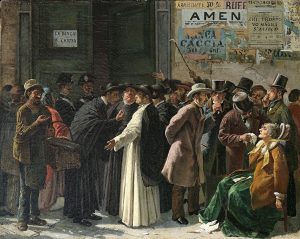 We’ve all heard the slogan, “United we stand, divided we fall” hundreds of times. It is portrayed as wisdom, but in fact it’s generally false. If you require a mass of bodies to charge another mass of bodies on a battlefield, unity matters. But when you want honesty, intelligence, compassion, innovation and evolution, unity is your enemy.
We’ve all heard the slogan, “United we stand, divided we fall” hundreds of times. It is portrayed as wisdom, but in fact it’s generally false. If you require a mass of bodies to charge another mass of bodies on a battlefield, unity matters. But when you want honesty, intelligence, compassion, innovation and evolution, unity is your enemy.
Unity works for body-power, but it works against all the higher and better aspects of our nature. That’s why the sacrifice collectors preach unity: they want obedient bodies, not self-determinant minds.
Spiritual Unity?
The really pernicious thing about unity is that it’s sold as some kind of spiritual ideal: We each sacrifice our ourselves, then we somehow become collective superheroes.
This also is false. The high and good – the truly spiritual – forms only in individuals. The more united our minds are, the more we decline. The more individual our minds, the more we rise.
Unity in the religious sense is a spiritualized dream of a free fix. By embracing unity, people hope to solve their personal deficits without work. Unification calls power down from heaven and we’re all magically fixed. It’s “spiritual,” after all.
The truth is this: Where individuality has had the upper hand, prosperity, growth, and invention have defined the times. Where collective ideals (like melting into one) have had the upper hand, humanity has declined.
A Bit of Support
Every mass tragedy over the past century has not only featured unity, but has been built with unity as its central component. This becomes utterly obvious with the use of just one word: collectivism.
Collectivism is unity by definition, and it stood at the heart of Mao’s China, Lenin and Stalin’s USSR, Pol Pot’s Cambodia, and the various Kims’ North Korea. As a first approximation, these unity traps killed 100 million people.
To them we can add Hitler and Mussolini, who enforced unity; nonconformists were imprisoned or killed. That provides additional tens of millions dead.
All of this hasn’t been lost on observers. Here are just two quotes:
An individual immersed for some length of time in a crowd soon finds himself – either in consequence of magnetic influence given out by the crowd or from some other cause of which we are ignorant – in a special state, which much resembles the state of fascination in which the hypnotized individual finds himself in the hands of the hypnotizer.
– Gustave Le BonMan as an individual is a genius. But men in the mass form a headless monster, a great, brutish idiot that goes where prodded.
– Charles Chaplin
And here are some opposite thoughts, from people who discovered creativity and growth through individuality:
Everything that is really great and inspiring is created by the individual who can labor in freedom.
– Albert EinsteinCivilization can only revive when there shall come into being in a number of individuals a new tone of mind independent of the one prevalent among the crowd and in opposition to it… the ethical comes into existence only in individuals.
– Albert SchweitzerThis I believe: that the free, exploring mind of the individual human is the most valuable thing in the world.
– John Steinbeck
Beneath The Slogans
The appeal to unity works, fundamentally, by abusing what Gustav Le Bon called “the instincts of the herd.” Ultimately it goes back to primate influences, but I’ve been covering that elsewhere and won’t delve into it today. It’s enough to say that unity operates mainly on an animal level.
When you have a massive and unified movement – a large crowd thinking and acting together – individual virtues are squeezed out, rather like this:
-
- Listening to the leader displaces self-judgment.
-
- Following the leader displaces self-motivation.
-
- Lauding the courage of the leader displaces the courage to act alone.
-
- Quoting the words of the leader displaces self-responsibility.
If we want real and enduring progress in the world, we must make our own decisions, take responsibility for our lives, and muster the courage to act alone. Until we can do that, we won’t move the world forward by any appreciable amount.
Mass movements and unifying leaders are devolutionary.
So…
So, if you need a pile of bodies to knock down other bodies, unity’s your ticket to it. If you want a large number of people to turn off their minds and follow you, unity is also your ticket. But if you want upright, creative and beneficial human beings, forget unity and start calling for individuality.
It’s as individuals that we rise. United we fall.
**
